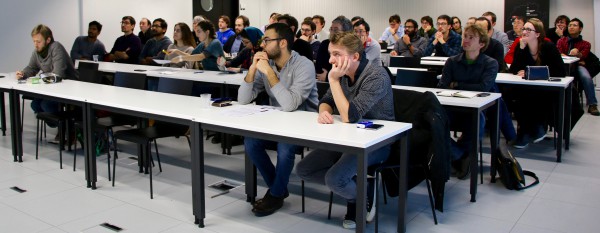MARVEL Junior Seminar — January 2022
https://epfl.zoom.us/j/68368776745
Password: 1923
The MARVEL Junior Seminars aim to intensify interactions between the MARVEL Junior scientists belonging to different research groups.
Each seminar consists of two presentations of 25 minutes each, allowing to present on a scientific question in depth, followed by time for discussion. The discussion is facilitated and timed by the chair.

MARVEL Junior Seminar Organizing Committee — Michele Kotiuga, Sara Fiore, Stefano Falletta, Kristians Cernevics, Max Veit and Patrick Mayor
Talk 1 — Non-Hermitian topology: from single-particle picture to many-body physics
Marta Brzezińska1, Faisal Alsallom1,2, Loic Herviou3, Oleg V. Yazyev1
1 Chair of Computational Condensed Matter Physics (C3MP), Institute of Physics, EPFL
2 Department of Physics, Massachusetts Institute of Technology, Cambridge, Massachusetts 02139, USA
3 Chair of Condensed Matter Theory (CTMC), Institute of Physics, EPFL
Non-Hermitian Hamiltonians provide an effective description of open, dissipative systems. In the context of band theory, non-Hermiticity gives rise to exotic phenomena such as exceptional points - stable degeneracies where eigenstates coalesce - or novel topological phases characterized by a winding of the eigenspectrum in the complex plane. Another feature intimately connected to non- Hermiticity is the skin effect, where all of the single-particle eigenstates of a system exponentially localize at one of its boundaries. The presence of the skin effect is related to the breakdown of conventional bulk-boundary correspondence, obscuring the prediction of universal boundary phenomena from the periodic bulk properties.
In this talk, I will discuss the fate of skin modes in many-body systems. Due to the non- orthogonality of the single-particle eigenstates of non-Hermitian Hamiltonians, the Pauli exclusion principle no longer acts trivially and competes with the skin effect. I will show that the scaling of the imbalance — the asymmetry of the density profile — with system size is directly linked to the structure of the spectrum of the corresponding periodic system. Remarkably, a similar relation also holds for disordered or interacting systems. This leads us to conjecture a novel, fundamentally many-body, bulk-boundary principle.
Talk 2 — Time-dependent self-consistent harmonic approximation: simulating quantum and anharmonic vibrational spectra at finite temperatures of solids and molecules
Lorenzo Monacelli1,2, Francesco Mauri2
1 Laboratory of Theory and Simulation of Materials (THEOS), Institute of Materials, EPFL
2 Dept. of Physics, University of Rome Sapienza, Italy
Vibrational spectroscopy, Raman and IR, are the most common way to characterize materials and molecules, as they carry essential information on local chemical environments and collective ionic excitations. In the standard harmonic picture, the IR absorption or Raman scattering peaks are sharp and their position does not depend on temperature.
However, in many natural systems, substantial deviations from the harmonic picture are observed.
In this talk, I introduce the Time-Dependent Self-Consistent Harmonic Approximation, a new way to simulate the full anharmonic vibrational spectra of solids and molecules accounting for quantum nuclear fluctuations and thermal dispersion.
I will show the case of solid molecular hydrogen at high pressure and ice in its VIII -> X phase transition. Both systems are made by light atoms (hydrogen), whose quantum fluctuations couple with anharmonicity, reshaping the vibrational spectrum entirely beyond what is achievable with standard molecular dynamics.
Check the list of the next MARVEL Junior Seminars here.
Low-volume newsletters, targeted to the scientific and industrial communities.
Subscribe to our newsletter